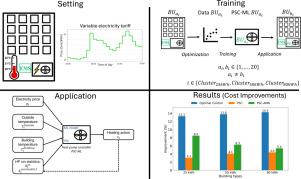Imitation learning with artificial neural networks for demand response with a heuristic control approach for heat pumps
IF 9.6
Q1 COMPUTER SCIENCE, ARTIFICIAL INTELLIGENCE
引用次数: 0
Abstract
The flexibility of electrical heating devices can help address the issues arising from the growing presence of unpredictable renewable energy sources in the energy system. In particular, heat pumps offer an effective solution by employing smart control methods that adjust the heat pump’s power output in reaction to demand response signals. This paper combines imitation learning based on an artificial neural network with an intelligent control approach for heat pumps. We train the model using the output data of an optimization problem to determine the optimal operation schedule of a heat pump. The objective is to minimize the electricity cost with a time-variable electricity tariff while keeping the building temperature within acceptable boundaries. We evaluate our developed novel method, PSC-ANN, on various multi-family buildings with differing insulation levels that utilize an underfloor heating system as thermal storage. The results show that PSC-ANN outperforms a positively evaluated intelligent control approach from the literature and a conventional control approach. Further, our experiments reveal that a trained imitation learning model for a specific building is also applicable to other similar buildings without the need to train it again with new data. Our developed approach also reduces the execution time compared to optimally solving the corresponding optimization problem. PSC-ANN can be integrated into multiple buildings, enabling them to better utilize renewable energy sources by adjusting their electricity consumption in response to volatile external signals.

利用人工神经网络进行模仿学习,采用启发式热泵控制方法进行需求响应
电加热设备的灵活性有助于解决能源系统中不可预测的可再生能源日益增多所带来的问题。尤其是热泵,它采用智能控制方法,可根据需求响应信号调整热泵的功率输出,从而提供有效的解决方案。本文将基于人工神经网络的模仿学习与热泵智能控制方法相结合。我们利用优化问题的输出数据来训练模型,以确定热泵的最佳运行时间表。其目标是在电费随时间变化的情况下最大限度地降低电费,同时将建筑物的温度控制在可接受的范围内。我们开发的新方法 PSC-ANN 在不同隔热水平的多户建筑上进行了评估,这些建筑使用地暖系统作为蓄热装置。结果表明,PSC-ANN 优于文献中得到积极评价的智能控制方法和传统控制方法。此外,我们的实验表明,针对特定建筑物训练的模仿学习模型也适用于其他类似建筑物,而无需再次使用新数据进行训练。与优化解决相应的优化问题相比,我们开发的方法还能缩短执行时间。PSC-ANN 可以集成到多栋建筑中,使它们能够根据不稳定的外部信号调整耗电量,从而更好地利用可再生能源。
本文章由计算机程序翻译,如有差异,请以英文原文为准。
求助全文
约1分钟内获得全文
求助全文
来源期刊

Energy and AI
Engineering-Engineering (miscellaneous)
CiteScore
16.50
自引率
0.00%
发文量
64
审稿时长
56 days
 求助内容:
求助内容: 应助结果提醒方式:
应助结果提醒方式:


